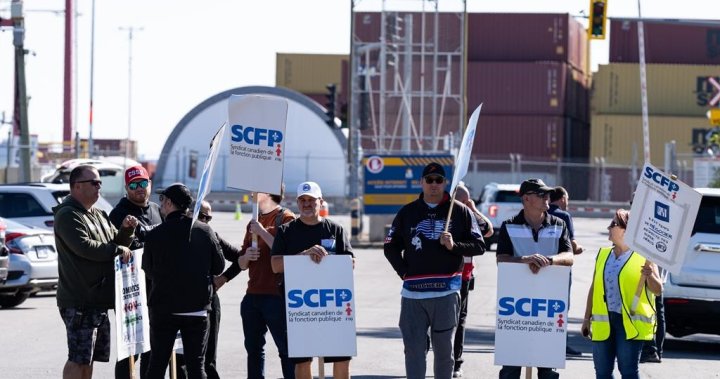Dockworkers at the Port of Montreal have decided to halt all overtime work as a pressure tactic against their employers during ongoing contract negotiations. The union, representing nearly 1,200 longshore workers, filed notice that the overtime strike will begin at 7 a.m. EDT today and will continue indefinitely. The main issue in the bargaining sessions is scheduling, and federal mediators have been brought in to assist in the negotiations. The Maritime Employers Association, representing shipping companies and terminal operators, has warned that employees assigned to shifts with incomplete crews will not be paid due to the impact on the flow of freight caused by slowdowns or stoppages.
The union spokesperson, Michel Murray, has stated that scheduling is a key stumbling block in the negotiations, which resumed on Friday alongside the federal mediators. The Maritime Employers Association has retaliated against the union’s strike by warning that employees working on shifts with incomplete crews will not be paid, as their actions contribute to slowing down or halting the transportation of freight. The association warns that the freeze on overtime work will have a significant impact on operations at the port. This limited job action comes after a three-day strike last week at two terminals that handle a large portion of the container traffic at the Port of Montreal.
The Port of Montreal is the second-largest port in Canada, and the recent labor disruptions have raised concerns about the impact on the transportation of goods and supplies. The ongoing contract talks have been challenging, with scheduling being a major point of contention between the union and the Maritime Employers Association. The involvement of federal mediators reflects the importance of reaching a resolution to avoid further disruptions to port operations. The freeze on overtime work is a tactic employed by the dockworkers to put pressure on their employers and push for favorable terms in the contract negotiations.
The union’s decision to halt all overtime work is a strategic move to leverage their position in the contract talks and signal their dissatisfaction with the current scheduling practices. The Maritime Employers Association’s response to the union’s strike action highlights the tensions between the two parties and the potential impact on the efficiency of port operations. The interruption in overtime work will likely cause disruptions to the flow of freight and could lead to delays in the transportation of goods through the port. The involvement of federal mediators indicates the complexity of the negotiations and the need for a resolution to restore normal operations at the Port of Montreal.
Overall, the situation at the Port of Montreal reflects the challenges faced in labor negotiations within the shipping industry and the impact of labor disruptions on port operations. The ongoing contract talks and the use of pressure tactics by the union and the Maritime Employers Association underscore the importance of reaching a mutual agreement to ensure the continued smooth functioning of the port. The freeze on overtime work will test the resilience of port operations and highlight the need for a timely resolution to the labor dispute. It remains to be seen how the negotiations will progress and what impact the ongoing labor actions will have on the transportation of goods through the Port of Montreal.













